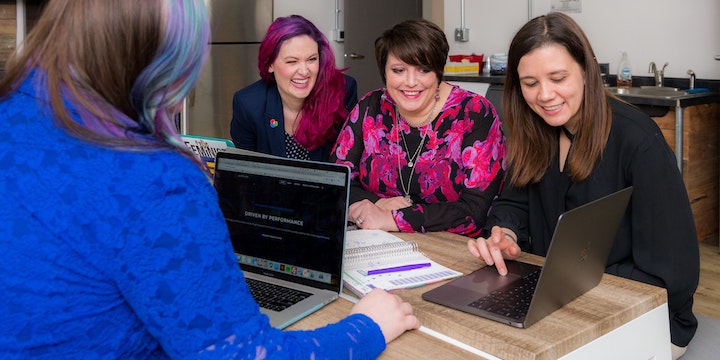
Could you be happier at work?
Take our quiz and find out! It takes just five minutes and you'll get a data-packed report afterwards.
Things for teams to try: Improving Learning
Feeling great about the opportunities you have to learn leads to increased interest in and enthusiasm for work!

1. Notice where you find novelty
Find and create newness in your work to help boost happiness, productivity and learning.
How to do it:
- Individually, spend a few minutes thinking about the work you do focusing attention on the following questions:
- What scope is there in your role to find novelty?
- When do you feel newness in the work you do?
- Then, discuss as a team how opportunities for novelty are distributed across you all.
- Think about how you can change things so more of you have a greater number of opportunities to learn through the work that you do.
2. Identify what learning is missing
There are lots of different kinds of learning - formal training and the informal kind where we learn by watching how others do things. Sometimes we want to broaden what we know and other times, deepen what we know.
How to do it:
- Think about the kinds of learning opportunities you already get and those you would like more of.
- When you’re thinking about these, consider:
- What sorts of activities take you to your comfortable edge?
- Which conversations are mind expanding?
- Which work experiences are deepening?
- Informal learning opportunities are generally easier and quicker to organize - they're often about spending time with other teams and colleagues, as well as exchanging knowledge and experience internally.
3. Identify what's blocking you
Sometimes it’s as simple as really taking the time to think about what is getting in the way of learning.
How to do it:
- Come together as a team and talk about whether there is anything getting in the way of you learning more.
- Write down everything that feels like a blocker.
- Talk about how to create a team environment more supportive of learning and what that will involve, such as time, budgets, role variety.
4. Learning time
Putting learning on the calendar keeps it fresh in everyone’s thoughts and ensures it gets the attention it needs.
How to do it:
- Set aside an hour every month to come together to learn something new.
- You could try thinking of it a bit like a book club and:
- Create a shareable list and co-curate ideas of things to cover (your curriculum) like podcasts to listen to, TED talks to watch, and articles to read.
- Agree on one to read / watch / listen to for that month and share it.
- Everyone can then review that month’s learning ahead of the meeting.
- Come together to discuss what you learned or felt inspired by and how you could apply this to your life and work.
- Make sure you take a moment to discuss how it feels to step back and consider your work against a broader canvas of ideas, rather than just focusing on your “to-day lists”.